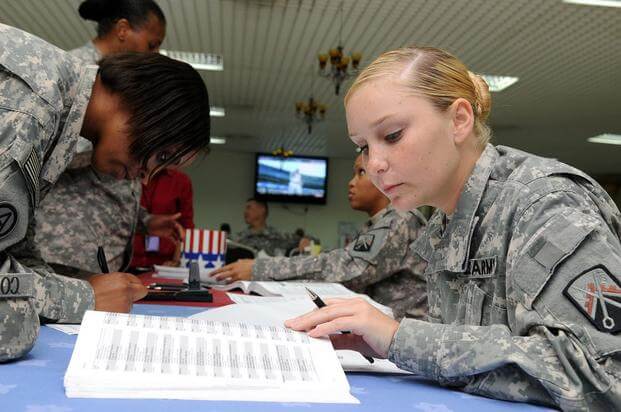As America struggles with the uncertainty of mail-in ballots before Tuesday's presidential election, SNAFUs with absentee voting are nothing new to U.S. military families, many of whom have been forced to vote far from home for years.
News reports paint a picture of concern over whether the U.S. Postal Service will be able to deliver the millions of mail-in ballots in time for the votes to count in the high-stakes Nov. 3 election between incumbent President Donald Trump and Democratic candidate Joe Biden.
For members of the military, voting absentee is standard operating procedure. As NBC reported, the military was responsible for 3.2 million absentee ballots cast in the 1944 presidential election during World War II. According to the Federal Voting Assistance Program, roughly three-quarters of the 1.3 million service members meet eligibility criteria for absentee voting due to being stationed away from their primary residence. In the 2016 presidential election, 930,156 Uniformed and Overseas Citizens Absentee Voting Act (UOCAVA) ballots were sent out, with a return rate of more than 68%.
The percentage of troops voting absentee successfully has been rising; FVAP reports that, in the most recent election, some 17% of military members were unable to vote because of problems receiving their absentee ballot, down from 30% from 2000 to 2004.
Many veterans of past elections say the system had worked smoothly for them. A few, though, say they've had their votes disappear and since vowed to always vote in-person.
Read Next: Air Force Moves Forward with Plan to Turn Giant Cargo Planes into Bomb Trucks
Alan Burgess, a retired Air Force major, remembers trying to vote in a special election in his home state of New York while he was stationed at Incirlik, Turkey.
"I requested the absentee ballot immediately but received the ballot after the election date," Burgess said in a written response to a Military.com survey on military voting.
"I was chagrined to find out that the election has resulted in a dead even tie. Both candidates had to meet at the courthouse, where the result was decided by a coin toss!"
Burgess wrote to the New York secretary of state to complain, but "but they assumed no responsibility for the poor service in sending my ballot."
"I never felt that my vote was more important to an election, or less valued in the end," Burgess wrote.
"Once I came back home, I made sure I was always registered to vote and have never missed another opportunity to vote in any local, state or national election since. Perfect record since 1976."
Andrea Allaire, the wife of a retired Army sergeant first class, also had a negative experience when she tried to vote absentee in a 2004 New Jersey election while stationed at Fort Drum, New York.
She was concerned about the "perforated tab attached" to the outside of the voting envelope that said red letters "Do Not Detach."
"I was concerned it would be torn off in transit," she wrote, but followed the instructions and mailed the envelope as instructed.
"A few weeks later, I received a letter in the mail informing me my vote did not count! ... I was so mad my vote had not counted.
"After that, I made sure I was able to vote in person."
Dwight Collins, a retired U.S. Coast Guard captain, said had a pretty good experience with absentee voting, only missing out on voting in one election in his 27 years of service.
"I missed registration deadlines in 1996 (we had [a permanent change of station] that year) and did not vote in that year's presidential election," he wrote. "Otherwise, I always assumed my vote was counted."
Patrick Richardson, a retired Army major, said he voted in three elections while serving in the Vietnam war and a dozen more while serving stateside at Fort Rucker, Alabama; Fort Sill, Oklahoma; and Fort Bliss, Texas.
"Not once was there ever a problem," Richardson wrote. "My 'secret' to successful voting by mail is to read all of the instructions and follow them to the letter."
Sgt. Major of the Army Michael Grinston has voted multiple times by mail-in ballot during his 33 years of service.
"It's what I have used almost every time when an election comes up because I have been in the Army, and I have not been in my own state for a very long time," Grinston told reporters at the recent Association of the United States Army's annual meeting.
Grinston said there is no reason for soldiers to feel that they have to navigate the voting process alone.
"We have voting assistance officers that will guide them through and help them out," Grinston said, describing how the service has voting assistance at the battalion and brigade level of every unit.
"We also do specific training so that a soldier has someone to go to in their unit to help them when they want to do a mail-in ballot," Grinston said. "This is common; we have done this for a long time."
-- Hope Hodge Seck contributed to this report.
-- Matthew Cox can be reached at matthew.cox@military.com.
Related: The Military Vote Could Be the Key to Winning Florida in 2020













